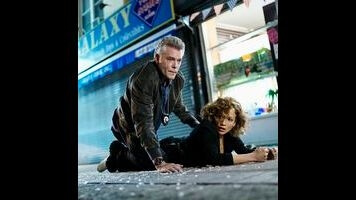Jennifer Lopez signals the type of part she’s playing by her hair. If she’s rocking the long flowing mane, then she’s Jenny Diva Pop Queen who defies anyone to comment on her age with every catsuit she dons. When she goes for the sensible bob, it’s time for serious Jennifer, who is most likely about to find herself, and subsequently extricate herself from the peril she’s in.
Santos’ daughter gives her an excuse to take bribes and payouts, but also becomes Santos’ downfall when she’s picked up by an anti-corruption FBI unit, led by Warren Kole. The feds reason that if Santos is willing to break the law for that angelic cello-playing daughter, she’ll certainly be willing to help the law to stay with her. Play informant for the crew—including ratting on The Sopranos’ Drea De Matteo and Crazy Ex-Girlfriend’s Santino Fontana—or risk a decade in jail.
During a time when police forces across the country are under scrutiny for excessive force and their precarious relationships with the communities they are assigned to protect, Shades Of Blues’ version of a corrupt cop is almost quaint. Some instances of a coverup in Shades Of Blue seem to more accurately reflect the current climate, but that overall quaintness is on purpose in a lot of ways. When Santos is picked up by the FBI, she sneers that no one should win a medal for picking up a detective taking kickbacks in Brooklyn. Santos may be corrupt, but she still needs to be inherently likable so that audience still roots for her. She may cover up the murder of a drug dealer, but he was dealing in a school zone. Shades Of Blue deals in the moral ambiguity of being the one bestowed with the power to mete out justice. When do the ends stop justifying the means, and do they ever really stop at all?
Shades Of Blue doesn’t have the same balls that The Shield did by making the central figure a person who could do truly reprehensible things, yet still dare you to like him. But it’s not a slog to watch thanks to Lopez and Liotta, the former a charismatic star who knows how to subvert her own victimhood, and the latter a guy who has become an expert in all kinds of scenery chewing. Like the FBI agent on Santos’ tail, Woz takes what could be considered an overbearing interest in Santos, his right hand. But Liotta is one of the few guys who can spit out lines like, “You want to save a pup from drowning, I appreciate the instinct… but never risk a hole in my boat unless you’re positive you can plug it,” or “One slip and we all go tumbling down. And I don’t tumble well,” without any trace of a wink and a nod. And say what you will about Lopez’s post-Out Of Sight career, but in Santos she can find a way to be all of the roles she likes to play onscreen: mother, savior, victim, sex symbol. Lopez has played this sort of part before, and she’s good at it. She’s not taking any risks, but it’s hard to fault the not-broke model, especially for Lopez’s first real plunge into dramatic TV.
Everything else borders on inconsequential. While the plot starts out cut and dry, it becomes more twisty and turny in a way that will eventually bring the audience back to the opening scene of a makeup-less, de-glammed Santos confessing her sins into a camera. It’s one of the few times the show veers toward making her look interesting, as opposed to just making her look good.

